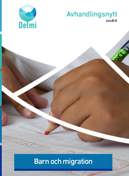The participation of foreign-born people in the labour market is a constantly politically relevant issue for several reasons; it is central in the integration process and it is of great importance both for the individual and for the Swedish labour market and economy in general. This anthology contains summaries of four chapters in recently published doctoral dissertations concerning the conditions of foreign-born for establishment in the labour market, with a focus on several different policy areas: temporary versus permanent residence permits, labour immigration and entrepreneurship, as well as segregation in school and working life. The studies included in the report and the main results are:
- Kristoffer Jutvik studies how a transition from temporary to permanent residence permits for asylum seekers from Syria affected their establishment in the labour market. He finds that those who were granted permanent residence permits to a greater extent participated in education, while those with temporary residence permits had higher incomes and to a lesser extent were unemployed.
- Matilda Kilström and Elisabet Olme are studying a policy change in Denmark which meant that the time that asylum seekers who were granted a temporary residence permit had to stay in Denmark before they could apply for a permanent residence permit was extended from three to seven years, and find no effects on labour market establishment among those who migrated to Denmark after the reform. However, they find that more people, especially women and low-skilled, chose to study after the reform.
- Aliaksei Kazlou studies the labour immigration reform in 2008 and its effect on those who migrated to Sweden and started companies. He finds, among other things, that the average income increased among self-employed people who migrated after the reform and that the gap between these entrepreneurs and native entrepreneurs decreased. They conclude that this was due both to the fact that the reform led to an improved corporate environment and that the composition of skills among those who arrived after the reform changed to some extent.
- Debbie Lau concludes that school segregation can have consequences for segregation later in life for people with an immigrant background. She finds that people with an immigrant background who have more schoolmates who are from the same region of origin as oneself, tend to later work in workplaces with more colleagues from the same region of origin, and to a much greater extent have a partner with an immigrant background.
Delmi's hope is that this anthology will reach a wide audience, as well as encourage debate and discussion about the situation of foreign - born people in the labour market.
On behalf of Delmi, Johanna Hemberg and Linus Liljeberg have written and compiled this report. Temporary residence permits, self-employment and school segregation - Dissertations on foreign-born in the labour market (2021:5) is included in Delmi's Dissertation series.
Picture by StockSnap from Pixabay.



